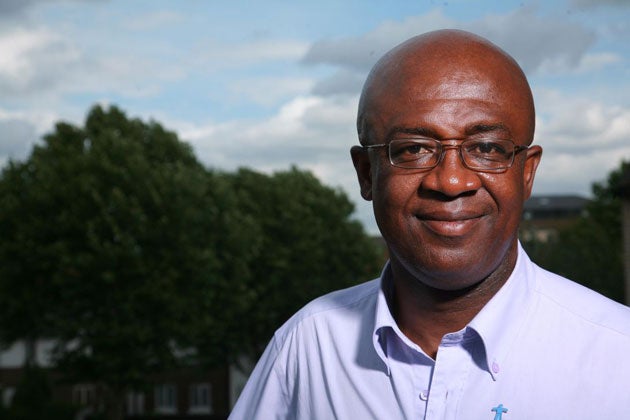Prostate cancer death rate halved by new treatment
Patients should be given combination of radiotherapy and drugs, scientists say

Giving men with high-risk prostate cancer two treatments instead of one halves the death rate, scientists have found. The effects are so striking that radiotherapy combined with hormonal (drug) treatment should be the new standard for these patients, they say.
Prostate cancer is the commonest cancer in men with 35,000 new cases a year and 10,000 deaths. It is one of the most rapidly increasing cancers but there is no reliable test for the disease.
Potentially curative treatments for early, non-aggressive cancer include surgery to remove the prostate gland and targeted radiotherapy. But when the tumour is starting to break out and invade surrounding tissues, doctors consider that "the horse has bolted". In these circumstances a strategy of containment rather than cure is adopted.
Hormone, or endocrine, therapy – which stops tumours being fuelled by testosterone – is currently one of the most common ways of tackling locally advanced prostate cancer.
But new findings published online in The Lancet today show that survival can be dramatically improved if radiotherapy is used as well.
The findings are based on a trial of more than 800 men in Scandinavia who were randomly allocated to receive radiotherapy with hormonal treatment or hormonal treatment alone. Over 10 years almost one in four (23.9 per cent) of those who received the hormonal treatment alone had died compared with just over one in 10 (11.9 per cent) of those who had the two treatments combined – hormonal treatment with radiotherapy.
Recurrence of the cancer, defined by rising levels of the blood marker prostate specific antigen (PSA), was nearly three times higher among patients only given hormone therapy.
However, side effects including urinary incontinence and impotence were slightly more frequent among the patients who had radiotherapy.
The authors, led by Professor Anders Widmark, from Umea University in Sweden, say the "significant superiority" of the combined treatment and its similar side effects suggest it "should be the new standard of care for these patients." In an accompanying commentary in The Lancet, British prostate cancer specialists Chris Parker and Alex Tan of the Institute for Cancer Research in Sutton, Surrey, describe the trial as pivotal. "The results should change current practice, making long-term hormonal therapy plus radical radiotherapy the standard of care for men with locally advanced prostate cancer."
John Neate, chief executive of the Prostate Cancer Charity, said the study, which began in 1996, represented "real progress". Better treatments were already available, he said.
"The study also offers information on the possible risks. While we welcome the undoubted potential progress in terms of lives saved, it is important not to dismiss the increased risk of long-term side effects on gut, bladder and sexual function.
"However, some progress in minimising the adverse effects on quality of life of combining a course of radiotherapy with hormone therapy may already be on the way. Current medical practice now means the dose of radiotherapy is bigger and better targeted – hitting the cancer more forcefully with less chance of damage to healthy tissues, thus reducing the risk of likely side effects."
Phil Kissi: 'There is help out there but men have too much pride'
Phil Kissi, 51, who has three children, is a senior manager at the Department for Work and Pensions and a part-time sports coach
It was October 2005. I remember very clearly watching one of these BBC hospital programmes on a day off. There was a feature on prostate cancer, in which I learnt that members of ethnic minorities are three times more likely to have the disease. It highlighted the dangers of not getting checked out, and I have to say I was rather shocked at what I saw.
So I had a blood test, which came back negative. But luckily my doctor advised me to have another check in six months' time. This time I ended up having a biopsy which showed I had early, aggressive prostate cancer. Consultants at Guy's Hospital sat me down and went through the options with me. I plumped for robotic surgery to have the prostate removed totally, and went through with the operation on 4 October that year. I was back at work 13 days later.
Both the two main health concerns – urine control and erectile dysfunction – were problems initially but have been successfully treated.
The main lesson I learnt is that there is fantastic help out there. The NHS have been brilliant, and The Prostate Cancer Charity has been an inspiration, but I sometimes feel that we men – and if I'm honest it's an especially big problem in some ethnic minority communities – have too much pride.
I'm extremely excited to hear about the results of recent work on radiotherapy and hormone treatment. It's an option I would have taken very seriously had it been available to me. When you're first diagnosed you want as much information as possible, and to know there are several options open to you. Anything that gives patients a clearer understanding of what is going on, and a sense that they can choose between different paths, is to be welcomed. The early signs from this research are encouraging because they do just that.
Subscribe to Independent Premium to bookmark this article
Want to bookmark your favourite articles and stories to read or reference later? Start your Independent Premium subscription today.

Join our commenting forum
Join thought-provoking conversations, follow other Independent readers and see their replies